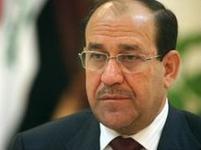 Iraq's parliament has approved a new government including all major factions, ending nine months of deadlock after inconclusive elections.
Iraq's parliament has approved a new government including all major factions, ending nine months of deadlock after inconclusive elections.In a special session, MPs voted for the 29 ministerial candidates nominated by Prime Minister Nouri Maliki, a Shia, who was reappointed for a second term.
But doubts persist about whether all the political groups can work together.
The key ministries of interior, defence and national security remain unfilled because nominees could not be agreed.
The BBC's Gabriel Gatehouse in Baghdad says these portfolios are especially sensitive as Iraq's rival factions watch keenly for signs that the country's security forces might be being used to promote sectarianism.
US President Barack Obama called the approval of the cabinet a "major step forward in advancing national unity".
"Their decision to form an inclusive partnership government is a clear rejection of the efforts by extremists to spur sectarian division," he said.
Acting appointments
The parliamentary election held on 7 March left no one group with a majority in Iraq's 325-seat Council of Representatives.
Former Prime Minister Iyad Allawi's Sunni-backed al-Iraqiyya bloc beat Mr Maliki's State of Law coalition by two votes, but he was unable to form a government.
It was Mr Maliki who eventually garnered enough support by merging State of Law with the Iraqi National Alliance of the radical Shia cleric Moqtada Sadr in June to form the National Alliance, and then agreeing a power-sharing deal in early November with the Kurdistan Alliance and a reluctant al-Iraqiyya.
The pact also returned Jalal Talabani, a Kurd, as president and made Osama al-Nujaifi, a Sunni Arab, speaker of parliament.
Mr Maliki had been due to unveil his 42-member cabinet on Monday, but last-minute negotiations between rival parties postponed the move.
The following day, with some of the sticking points supposedly resolved, the Council of Representatives was asked to approve a list of 29 permanent ministers that Mr Maliki read out.
The 13 acting appointments do not need to be approved by MPs.
Oil Minister Hussein al-Shahristani, a Shia, was promoted to deputy prime minister for energy, with his post taken by his deputy, Abdul Karim al-Luaibi, also a Shia.
The prominent Sunni Arab politicians, Saleh al-Mutlaq and Rafi al-Issawi, were appointed deputy prime minister and finance minister respectively, while veteran Foreign Minister Hoshyar Zebari, a Kurd, retained his post.
The parliament also approved the creation of a National Council for Strategic Policies, headed by Mr Allawi. It is intended to oversee foreign policy and security issues, but it is not clear how much power it will have.
MPs also backed a plan to liberalise Iraq's economy, fight terrorism, address ongoing sectarian divisions, and repair relations with neighbouring Sunni-dominated Arab countries.
'Difficult task'
In a speech before the votes, Mr Maliki acknowledged that it had been a considerable challenge to form a government acceptable to all factions.
"I do not say that this government, with all its formations, satisfies its citizens' aspirations, nor the political blocs', nor my ambition, nor any other person's ambition, because it is formed... in extraordinary circumstances," he said. "[But] this is what we have."
The prime minister said he had delayed proposing ministers for the three security portfolios because he needed more time to evaluate the options, having received some proposals as late as Tuesday.
"I need more time to choose better, and I will continue to study the [candidates] to be able to choose on the basis of efficiency and professionalism," he said.
He also said the lack of women nominees for any of the ministries had also been a reason for the postponement of the cabinet appointments.
"I find myself obliged... to wait for the political entities to present women candidates," he said.
Minister of State Bushra Hussein Saleh was the only one approved on Tuesday, while there were four women in the previous government.
Mr Allawi told MPs that his bloc would participate fully in the government.
"We wish the government success in its task to meet demands of the Iraqi people, who have waited long to see this accomplishment," he said.
"We as the al-Iraqiyya bloc declare our full support for this government and we will play an active, productive and co-operative role. We will also also work to bolster trust as long as we find a similar spirit from our partners in the political process," he added.
Our correspondent says there are still some negotiations ahead, but the big test now will be whether the members of this new national unity government, who have spent the past nine months fighting and arguing with each other, can pull together for the good of the whole country.



